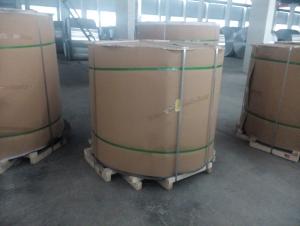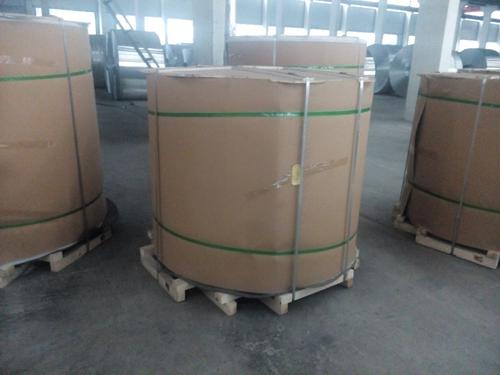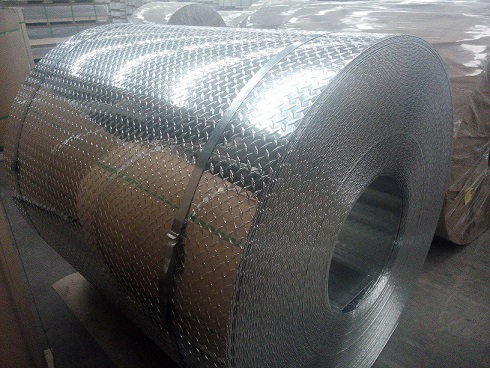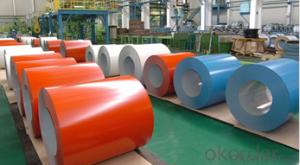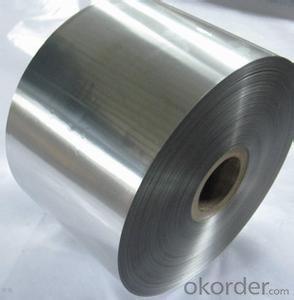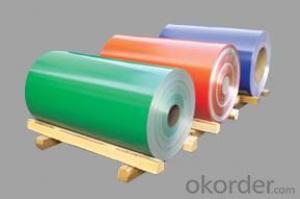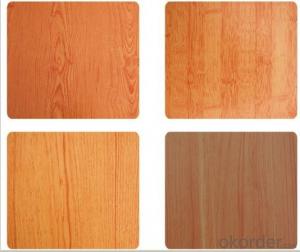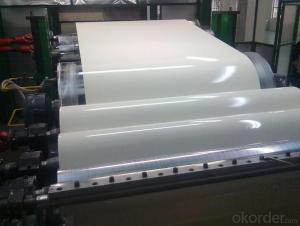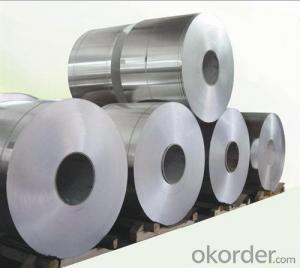Pvc Coated Pattern Aluminum Coil Stock
- Loading Port:
- China Main Port
- Payment Terms:
- TT OR LC
- Min Order Qty:
- -
- Supply Capability:
- -
OKorder Service Pledge
OKorder Financial Service
You Might Also Like
Pointer type pattern roll.Aluminum hard alloy checkered plate: 3003 as the main raw materials, strength slightly higher than ordinary aluminumalloy pattern plate, has a certain anti rust performance.Mainly used for non slip floor and building decoration etc.I produced the thickness range from 1.143mm to 3.175mm, width range from 900mm to 1500mm. The pattern of reinforced high according to the thickness of the aluminum plate was increased from 0.6mm to 1.2mm .3003 alloy. Smooth and bright surface, the pattern for a bar, also known as pointer type. Mainly for export. For export packagingvertical packing seaworthy,Plate thickness 1.143mm, corresponding to the pattern height 0.6mm, plate thickness 1.422mm, corresponding to the pattern height 0.65mm, plate thickness of 1.473 corresponding pattern, height 0.7mm; aluminum thickness 1.60mm,corresponding to the pattern height 0.80mm, plate thickness of 2.0mm, the corresponding pattern height 0.90mm;aluminum thickness 2.54mm, the corresponding pattern height 1.0mm; aluminum thickness 3.0mm
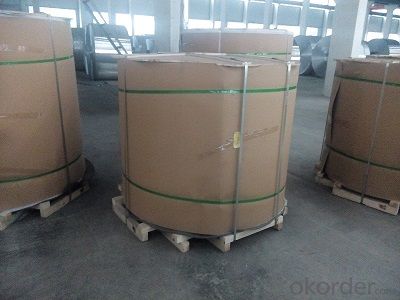
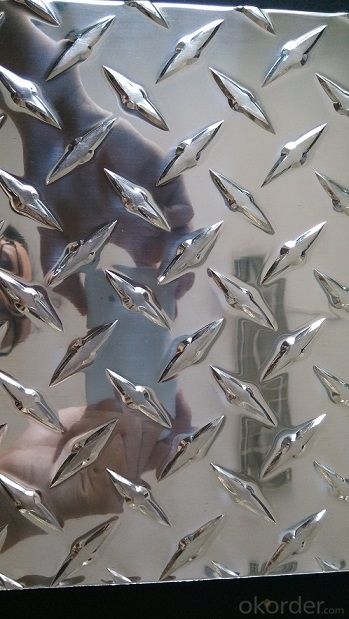
- Q: What is the typical coefficient of friction for aluminum coils?
- The typical coefficient of friction for aluminum coils can vary depending on various factors such as the surface it is in contact with, the presence of lubricants, and the specific conditions of the application. However, aluminum generally exhibits a low coefficient of friction, usually ranging from 0.2 to 0.4.
- Q: What is the composition of aluminum coils?
- Pure aluminum coils typically contain 99.5% aluminum and trace amounts of other elements. Conversely, aluminum alloys are formed by blending aluminum with metals like copper, magnesium, manganese, or zinc. These alloys are specifically engineered to bolster the strength, corrosion resistance, and other desired characteristics of the aluminum coils. The precise composition of the coils may differ based on the particular application and requirements, but in general, they contain a significant proportion of aluminum along with small quantities of other elements to yield a sturdier and more effective product.
- Q: Why the aluminum sheet crack after?
- What I want to add is to choose such welding wires as 5383 or 5183 wire whose magnesium content is higher than 5754 wire. The loss of magnesium due to high temperature in welding process may reduce the intensity of welding area.
- Q: Are there any certifications or standards for aluminum coils?
- Certifications and standards exist for aluminum coils, ensuring their quality and performance. The Aluminum Association's Certification Program is widely recognized as the most prominent certification for aluminum coils. This program guarantees that the coils meet the specific standards and requirements established by the association. Moreover, multiple organizations such as ASTM International, ASME, and ISO have set various standards and specifications governing the manufacturing and performance of aluminum coils. These standards encompass crucial aspects like the coils' chemical composition, mechanical properties, and dimensional tolerances, guaranteeing compliance with industry requirements.
- Q: I was at an art festival and saw one of the most unique displays ever. The artist had painted abstract art on a piece of aluminum (or some type of aluminum type sheeting) I, being a novice artist for many years, was very intrigued and would LOVE to learn more about it. I've done searches on the internet, to no avail. Anyone have any ideas?
- I've known a couple of people who do this, you might try a search on Floating Panel. You could try to search out things on an artist called Gary Hume, as I know that his earlier paintings, certainly the ones for which he's known, were executed on aluminium. From what I remember of people doing this (some one on my MA made paintings on aluminium) the trick is in the priming, it being a non-pours surface. You need to rough the ground considerably and prime quite thickly. You also need to baton on the back, this will allow you to attach to the wall without ruining the face of the support, and prevent the possibility of warping. What looks great is if you recess the batons from the edge of the support, so that when against the wall they cannot be seen, this gives the appearance of hovering, and shows the thinness of your support. Another reason you might not be getting too many hits on your searches is the spelling, while not incorrect you might find art suppliers using the English, rather than the American spelling; aluminium rather than aluminum. I know that sounds petty but it might make a difference. The only other thing I know, while finding it a great surface to work on, smooth, bright, the artist I know also found it very expensive.
- Q: Can aluminum coils be used for food processing equipment?
- Food processing equipment can indeed utilize aluminum coils. The reason behind the popularity of aluminum in this context lies in its remarkable thermal conductivity, resistance to corrosion, and lightweight properties. The food industry heavily relies on aluminum for a variety of applications, including heat exchangers, evaporators, and condensers. Specifically engineered to effectively transfer heat and uphold a consistent temperature, aluminum coils prove to be ideal for food processing equipment that demands precise temperature control. Moreover, aluminum is a non-toxic material, guaranteeing that it does not contaminate the processed food. Consequently, aluminum coils establish themselves as a dependable and secure choice for food processing equipment.
- Q: Is it possible to use aluminum coil for creating a sculpture?
- <p>Yes, you can use aluminum coil to make a sculpture. Aluminum is a versatile material known for its strength, lightweight, and malleability, which makes it suitable for sculpting. It can be bent, twisted, and shaped into various forms. When working with aluminum coil, you can use tools like pliers, wire cutters, and a metal bender to manipulate the coil into the desired sculpture shape. Ensure you take safety precautions, such as wearing gloves and eye protection, due to the sharp edges and the risk of injury from handling metal.</p>
- Q: Can aluminum coils be used for electrical applications?
- Yes, aluminum coils can be used for electrical applications. Aluminum is a highly conductive material and is commonly used in various electrical applications such as transformers, motors, and generators. It offers advantages such as lightweight, good thermal conductivity, and cost-effectiveness, making it a suitable choice for electrical coils.
- Q: I did a activity series lab and on my data table, it shows that lead reacted more than aluminum did, but aluminum is more active than lead. So, why does it show that lead is more active when it really isn't? Is it human error?
- Aluminum is more active than lead. You should double check your activity data table. If you confirm that the table says that lead is more active than aluminum, the table is in error.
- Q: Will aluminum foil go off in a metal detector
- aluminum is undectable if you wrap your eay pass in it it wont register. i tried it. and a feriday cage wraped in tinfoil will block all signals to everything
Send your message to us
Pvc Coated Pattern Aluminum Coil Stock
- Loading Port:
- China Main Port
- Payment Terms:
- TT OR LC
- Min Order Qty:
- -
- Supply Capability:
- -
OKorder Service Pledge
OKorder Financial Service
Similar products
Hot products
Hot Searches
Related keywords
